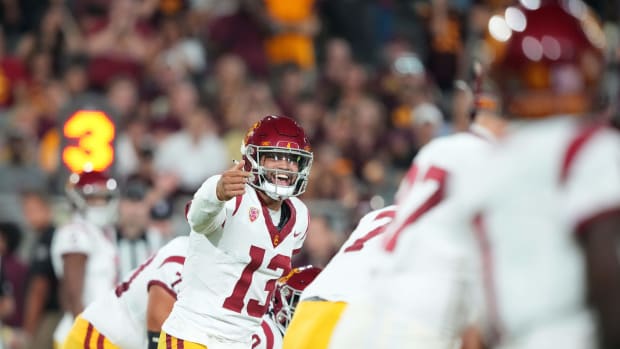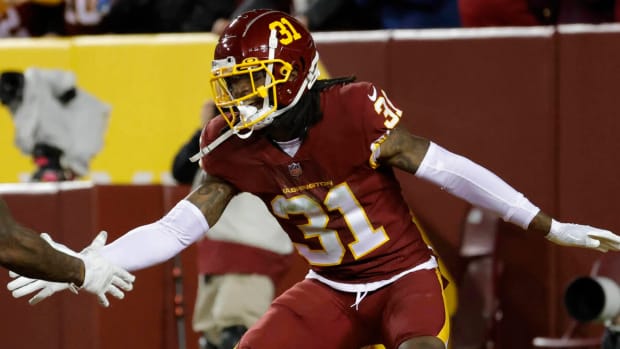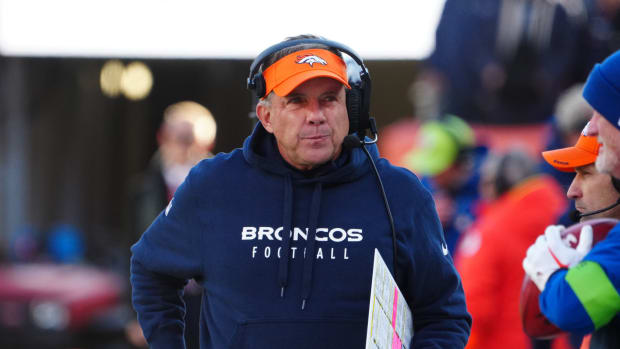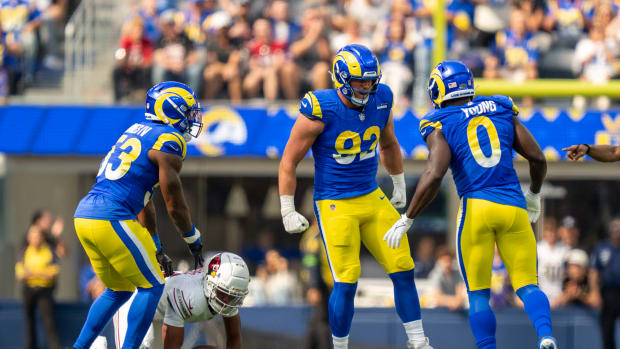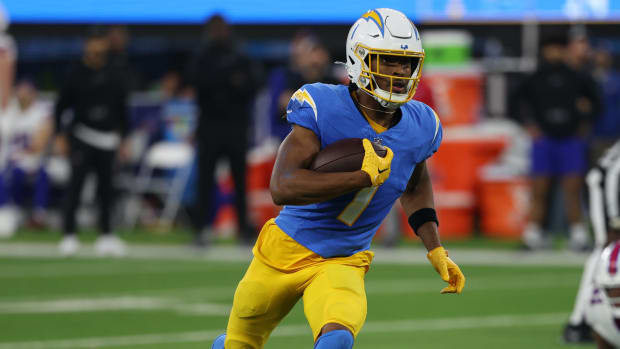Lamar Jackson’s Lack of a Contract Extension Looks More Curious Than Ever
The strange saga of Lamar Jackson’s lack of a contract extension continues. The fact that Jackson and the Ravens haven’t reached agreement on a contract extension as he now enters his fifth season with the team (four of them as the team’s starting quarterback) remains, to me, the most head-scratching topic in the business of the NFL.
And now, with a certain contract from the Browns clearly setting the market for top-tier quarterback compensation, the lack of extension is more curious than ever. Let’s examine.
Lack of agent should not mean lack of contract
There has been much made about Jackson’s not having a traditional agent to negotiate with the Ravens. Similarly, there was much made about Jackson’s not having an agent when he negotiated his rookie contract with the Ravens. It was not an issue then (Jackson received a market contract in line with his draft position) and, as explained below, it should not be that much of an issue now.
There are, it appears, two separate issues revolving around Jackson’s refusal to hire an agent: 1) his desire to avoid paying an agent fee, and; 2) the reason there has been no movement on this contract. Both sound good in theory, but may not reflect reality.
Agent fee
If we know anything about the cutthroat business of NFL agents, we know this: If Jackson hired an agent, it wouldn’t cost him much at all—perhaps a nominal fee, if that. Although NFLPA-certified agents can charge as much as 3% on contract compensation, the race to represent Jackson would bring that fee down dramatically. There are qualified, reputable and experienced agents who would slash their fees to 1% or lower to rep a player of the magnitude of Jackson, the 2019 league MVP. Heck, top agencies are charging 1% to represent top draft picks; they would go at least that low to represent Jackson.
Contract holdup
As for the lack of an agent holding up a deal with the Ravens, well, I am not so sure about that. More specifically, that depends on the Ravens. What we do not know is whether the Ravens have truly been ready to negotiate a marketplace deal with Jackson and whether that willingness has been stymied by Jackson.
As to the definition of a “marketplace deal,” well, therein lies the rub.
If the Ravens have been offering a true marketplace contract since the elephant in the room (the Deshaun Watson contract) surfaced, then the fact there is not contract is an indictment on Jackson.
If, however, the Ravens have not come to Jackson acknowledging and reflecting that five-year, fully guaranteed deal, that is on the Ravens.
Watson’s contract changed everything
Ironically, the need for Jackson to have an agent lessened dramatically when the Browns gave Watson the contract that they did, a contract that looks like it was written by the agent.
Prior to that contract being finalized, there were many different ways for agents and teams to haggle about a top-of-market contract for a quarterback. They could look at structure, term, signing bonus, early and late cash flow, length and security of guarantees, bonus forfeiture protections, cap impacts, etc.
That was all B.W. (before Watson). That haggling, for top quarterbacks, now should not be necessary. There is no argument over what the top of the NFL quarterback market looks like: It looks like what Watson got.
Reverberations for years
I have said it repeatedly, including in this space: Watson’s deal is the best player contract in the history of the NFL, and it is not close. It has rock-solid guarantees throughout the five-year term, a $46 million annual payout, protections from bonus forfeiture for suspension (yes, for this player) and more. While we waited decades for our “white whale”—the first NFL player to receive an NBA-like fully guaranteed five-year deal with all risk allocated to the team—I am still shaking my head that it is Watson, facing allegations of sexual harassment and misconduct from dozens of women, who signed it.
The contract will have dramatic effects on the future of the top quarterback market, especially on the negotiations of Joe Burrow with the Bengals and Justin Herbert with the Chargers next year. With a decades-long NFL funding rule that requires teams to fund future guaranteed amounts, Browns’ owner Jimmy Haslam has to place $180 million escrow on this contract. While he can, family-owned teams like the Bengals and Chargers simply don’t have $180 million to put in escrow. They truly cannot match the Watson contract and will have to tell that to their young superstar quarterbacks.
But that discussion is for another day. The immediate impact of the deal is on Jackson and the Ravens.
Bisciotti Cursing Haslam all the Way
Ravens owner Steve Bisciotti is astute enough to know how one bad deal can affect an entire industry. He is well aware what the Watson deal has done to his industry and more directly to him. Indeed, he was grousing about the Watson contract at the NFL owners’ meeting in March, knowing the price of retaining Jackson had just risen exponentially.
Were I the Ravens, I would have wanted a contract more like the Chiefs and Bills negotiated with Patrick Mahomes and Josh Allen, respectively. While total cash flow of those deals is strong, the structure and length heavily favor the teams. The Chiefs have Mahomes under contract through 2031; the Bills have Allen under contract through ’28. And here’s the real kicker: Unlike the Watson contract, most of those contract years are team-controlled and nonguaranteed. Of course, no one thinks those players would ever be cut, but it is the teams, not the players, that will have leverage on those deals down the line (unlike the Browns, who gave all the leverage to Watson). And their early three-year cash flow—Mahomes at $63 million and Allen at $95 million—pale in comparison to Watson’s staggering $138 million.
Of course, the Ravens—and all other NFL teams not named the Browns—will try to explain away the Watson contract by arguing that it is an outlier, that teams like the Falcons and Saints were bidding up his price, etc. To those inevitable arguments, it is up to Jackson—with or without an agent—to cut them off and simply say: “Whatever the circumstances were with Deshaun, the market is the market. I’ve been more productive, more successful and less injured than Deshaun. This is not complicated.” The Ravens, as much as they have to swallow hard to do so, can wrap up this negotiation in a minute if they just pay the Watson price and a small increase for waiting until after it to do this deal.
Are the Ravens trying to play the game of explaining away the Watson deal and anchoring talks around previous QB contracts? Or is it Jackson who curiously wants another type of deal?
The simple question for Bisciotti and the Ravens, and the simple question for this negotiation, is this: Are the Ravens willing to give Jackson the Watson market contract?
If so, he should sign it, with or without an agent.
If not, the Ravens are trying to sign Jackson below market, and that’s not good for either side.
Style of play
Finally, there are those who say that paying Jackson a top-of-market contract would be dangerous for the Ravens due to his style of play and accumulation of contact. It is not clear whether that is a line of thinking coming from the Ravens but if so, Jackson—again, with or without an agent—should dismiss it as out of hand.
These are not fantasy football negotiations; this is real life. And as said above repeatedly, the market is the market. Avoidance of it—for whatever reason—is simply a team telling its player it does not want to do business with him.
If in fact the Ravens are using this argument—and I would be surprised if they are—they would be lucky if it has not already caused a rift with Jackson. Also, from what I can tell, the PR about the lack of a contract extension seems to blame Jackson more than the team for the lack of extension, which I also find curious.
Beyond all the noise about this lack of an extension, the crux of the matter comes down to these two questions:
One, do the Ravens want to do a deal? And if so, have they offered (at least) the Watson contract?
If the answer to both of those questions is yes, the lack of contract extension is on Jackson. If the answer to one or both of those questions is no, it’s on them.
Sometimes, the business of sports is simple.
Watch NFL all season long with fuboTV: Start a 7-day trial today!
More From SI:
• How the Ravens Are Fleecing the NFL Again
• Mark Andrews Wins Octopus of the Year
• Explaining Aaron Donald Contract: How the Rams Do It
• The Art of the NFL Superstar Social Media Unfollow



































